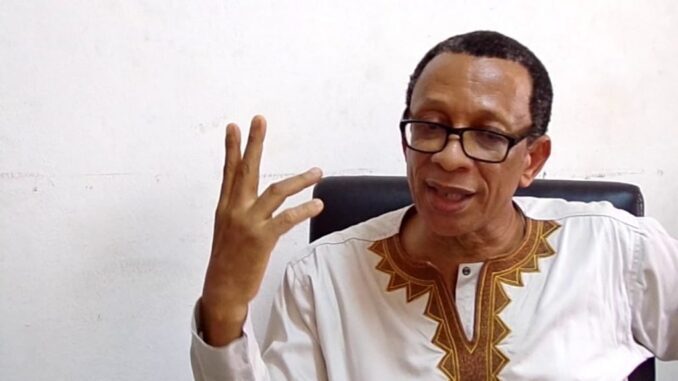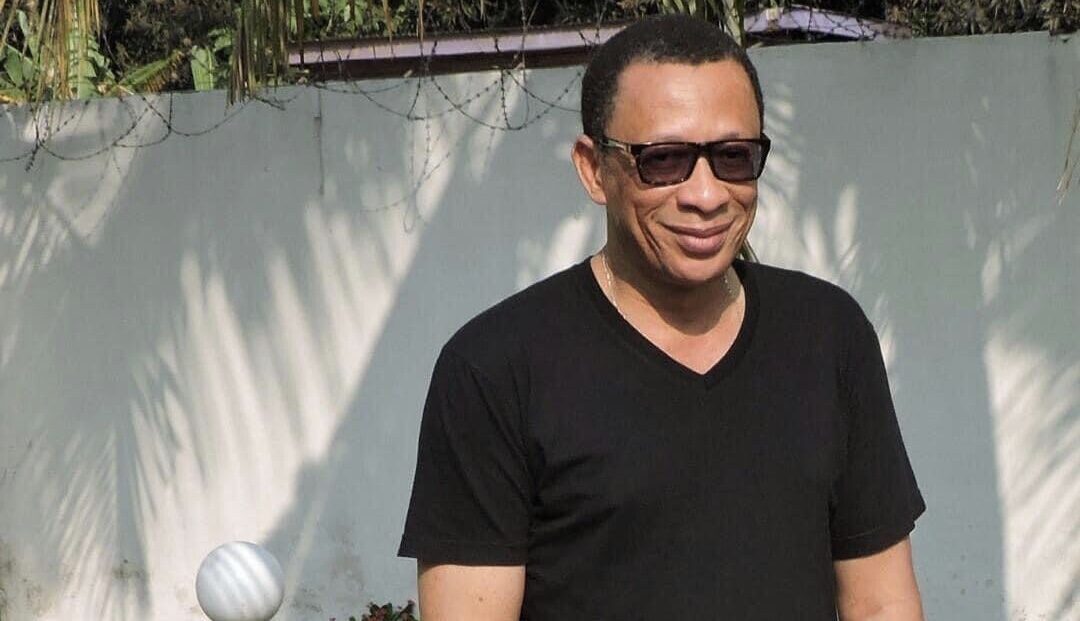
The Consortium of Progressive Political Parties (COPPP) hereby brings to the attention of the general public including our International partners our total rejection of the 2021 Mid-term census provisional results and call for swift positive action from Government, opposition, civil society and donor partners to resolve the issue so that it does not deteriorate into a matter of national security concern.
DR. DENNIS BRIGHT–LEADER OF COPPP
COPPP joins the continuing flow of concerned political parties, civil society organizations (CSOs) and Sierra Leoneans at home and abroad who in one voice have condemned the mid-term census and declared that the results are neither credible nor usable contrary to the predictable exception of the ruling Sierra Leone Peoples’ Party (SLPP) which owes a vested interest in the botched census.
The SLPP 2021 Mid-Term census is peculiar in many respects and has aroused controversy and opposition around its objectives, process, conduct and results from across political parties, civil society, and even the international community:
Objectives:
Government officials in collaboration with the Statistician-General had argued and possibly convinced donor partners that the purpose of the Mid-term census was to correct certain anomalies in the 2015 census and derive reliable data that would help in planning development across the country.
However, certain seasoned civil society organizations and a significant number of opposition political parties were very sceptical, some seeing this unusual proposal to hold a census before the completion of the ten-year census cycle as part of a ploy for the ruling SLPP party to gain undue advantage over others in the 2023 general elections.
One sign about this plan was noticed at the launch of the Strategic Plan of the Electoral Commission of Sierra Leone (ECSL) where it was indicated that although according to the calendar of the Commission, electoral boundary delimitation should be drawn in 2024, there was a chance that some “externalities” could change that: one of those “externalities” was given as the results of the mid-term census which could necessitate a carving of new districts and constituencies before the 2023 elections.
Indeed, the European Union Elections Observer Follow up Mission stated last year that conducting a census so close to an election was “unprecedented” and that “the use of an optional census to provide data which might be used to change electoral boundaries shortly before an election is not conducive to the political atmosphere or good electoral practice.”
In spite of these warnings and all the controversy, Statistics Sierra Leone (SSL) conducted the census anyway, and only two days after publication of provisional results ECSL has written to request the population figures per district and per council/locality “for the review of electoral boundaries.”
All this is indicating that those who had protested against the census claiming that it was being forced on the citizens not for development of their communities but rather for political purposes have been proved right. The Government lied!
Process
In regards to the process, once again the Government found shortcuts instead of following laid down Constitutional provisions. Opposition parties in Parliament maintained that implementation (including procurement of some materials) had actually started even before the President’s Proclamation was brought to Parliament; and even when this happened it was not properly laid before Parliament, causing an epic physical battle between SLPP and opposition Members of Parliament.
Opposition parties, some civil society organizations and even members of the Census Advisory Committee complained about lack of inclusivity in the planning process, especially at the Technical committee level. And during the period of implementation, when multiple issues emerged including around funding, payment of staff and complaints about people not seeing enumerators in their neighborhoods, SSL did not convene a single meeting of the Census Advisory Committee and only did so on 30th May 2022 to tell them that the provisional results would be announced the following day.
In the heat of contention, instead of engaging and conferring through the usual structures with the large numbers of people who had no trust in the process, SSL preferred to leave that to the Criminal Investigations Department (CID) and to proceed with the counting even under threat of huge abstention.
Still in terms of process, the World Bank which was a donor and technical partner at the outset raised alarm even before the conduct of the census and decided to opt out and stop funding. It warned SSL that:
“several critical action points require further technical work to be satisfactorily addressed including evaluation of the pilot census, the field operation plan for the enumeration, and ensuring enumerators are adequately trained. All these outstanding actions are necessary and must be addressed prior to commencing data collection to minimize the risk of inadequate and poor data quality. There is insufficient time between now and December 10, 2021 to satisfactorily address all pending actions”.
In spite of this advice, SSL went ahead and started counting on 10th December 2021. At this point, there was hardly any doubt that the census was heading for failure.
Conduct
One of the main causes for the failure of this census was the situation of the staff: enumerators and supervisors. As predicted by the World Bank, in the absence of a solid field operation plan for the enumeration, the entire process ended in chaos; enumerators were deployed into the field when even their training allowances had not been paid causing a loss of motivation, discontentment and much difficulty in their movement and the execution of their tasks; training ended the day before their deployment and so enumerators had no time to digest, settle down and prepare for the activity.
Interestingly in a message dated 2nd June 2022 entitled “payment of all outstanding allowances to 2021 Mid-Term Population and Housing Census Field Staff”, the Census Programme Manager gave reasons but actually confirmed that enumerators were unpaid to this day.
But what is even more alarming is that he therein referred to three categories of staff and the payment plan for each group: a) those who “worked covering from 51% to 70% of assigned workload” will be paid the 70% balance amount in full , b) those who “only completed between 31% and 50% of assigned workload” would receive half of the balance that they would have been paid for a complete job, and c) those “that only completed between 1% and 30% of assigned workload will be paid one-third of the balance they would have received had they done a complete job”. This is just showing clearly that there could be a significant amount of the work that was not done!
Another major issue is that enumerators just did not show up in whole neighborhoods. In a survey conducted by COPPP in the period 29th December 2021 to 9th January 2022 using KoBo Online Data Collection platform and a sample of 1,035 inhabitants in the 16 districts of Sierra Leone, 84.9% of respondents said that did not SEE any enumerator. Of the 15.1% that saw an enumerator only 4.8% were actually counted. This is suggesting an alarming outcome.
Contrary to the celebrations by SSL and Government that they have conducted a successful census, these facts are suggesting that we may be having a major hoax in our hands, one into which the SLPP Government almost succeeded in dragging reputable institutions such as the World Bank and other prestigious partners. A significant percentage of the population was not counted, and so there was no census! What was required was a census of the population and not of the willing or those who were lucky to have met an enumerator.
It is a shame that all these factors have made it difficult to assess the effectiveness of the use of electronic appliances (borrowed from Kenya) for data collection.
The problems relating to a dissatisfied and demotivated census field staff, some of whom have not been paid five months after the end of the exercise explains in part why the results turned out to be so unbelievably mediocre. SLPP executives are still complaining that abstentions from the census were the fault of opposition members who campaigned against the exercise. Even if this was so, it still did not make it a “population census” for as long as large portions of society did not believe in it and therefore refused to take part in it.
Results
A glimmer of hope is that the results in their current state are deemed “provisional”, and all it takes is for some good people to step forward and stop the Government from using these highly discredited data for any purpose that may upset the peace and plunge the country into chaos yet again. According to the provisional mid-term census results, between 2015 and 2021 the combined population of the North East, North West and Western Area reduced by 236,799 whereas the combined population of the South and East regions mounted by an additional 686, 214 inhabitants.
The capital city, the main urban center, according to the census report declined by 43%. These figures are presented to the public in spite of all the research that have shown a high level of migration to the city and how rapidly the population of the Western Area has grown as witnessed by the proliferation of slum settlements along the coastal areas and other parts of Freetown. Even Bo is presented as a more populated city than Freetown. Whereas the population in Bonthe, the President’s home district, is said to have increased by 50%, traditional opposition districts have shrinked, Bombali by 36% and Koinadugu by a ridiculous 50%.
In 2017, the then National Electoral Commission registered a total of 606,939 voters in Freetown. This number was restricted to only Sierra Leoneans above the age of 18. On the other hand, the SLPP 2021 mid-term census results say that there are only 606,701 inhabitants in Freetown (including zero to seventeen year olds and foreigners) i.e. less than the voter population in 2017.
The anomalies of the mid-term census results have been cited by several commentators, including Civil Society groups, in the past few days and need not be repeated. Suffice it to say that just as it will be foolhardy to base a development plan for the country and seek funding for it using these flawed figures it will also be extremely risky to attempt to carve electoral boundaries at this time using these botched results.
Implications
- Due to the insistence of Government to pursue its plan of conducting an unprecedented census against all the odds and technical advice, the whole exercise, judging by the provisional results, has turned out to be a complete failure.
- Inasmuch as there is evidence of mass opposition and non-participation in the 2021 Mid-Term Population and Housing census, it cannot be described as a “population census”.
- The provisional results are not credible and cannot be used meaningfully in any development plan or for the production of new electoral boundaries
- Because SSL deliberately ignored the advice by partners and experts to wait and be better prepared before starting the counting exercise, this institution bears the greatest responsibility for the resources wasted thereupon.
- If Government continues to seek to impose these false results on the country, it will be one more evidence of their unwillingness to embrace and practice democracy in Sierra Leone.
Recommendations
- An investigation must be instituted in the form of a qualifications audit of all senior staff working on the census project, particularly those whose qualifications and competence are currently being questioned by a whistleblower and who had direct supervision and authority over policy, planning and handling of census data. The investigation may seek to establish to what extent their ineptitude may have impacted on the quality of the data and could explain the mediocrity of the provisional results.
- Government must immediately issue a directive to the ECSL not to use the provisional census results as the basis for delimitation of boundaries and also through the Ministry of Development and Planning declare that these results are annulled.
- Government should immediately engage opposition political parties, civil society organizations and international partners (particularly those that funded the census) to discuss the way forward so as to avert any negative repercussions of the failure of the census.
- Government must expedite the payment of the census field staff, ensure that they are paid in full by SSL in order to avoid another industrial action, particularly if circumstances and factors not of their making could have contributed to their inability to complete their assigned tasks.
- COPPP proposes that the results of any investigation into the census issue be published.




